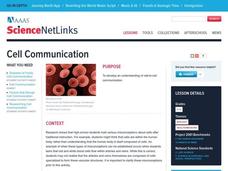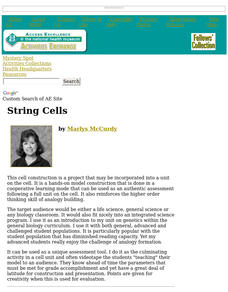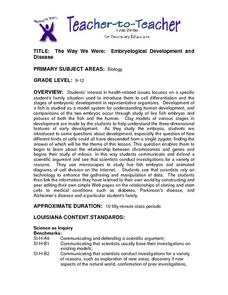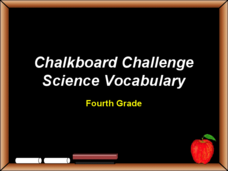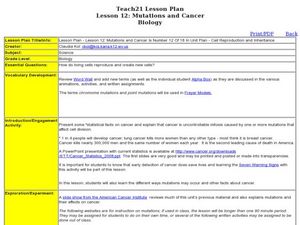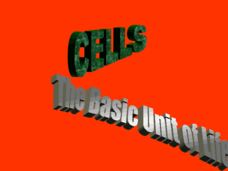Curated OER
Cell Communication
Students clarify common misconceptions about cells. They assess initial knowledge of cells and cell behavior, read and discuss an article and consider the role of cell communication in the diseases of diabetes, multiple sclerosis and...
Curated OER
String Cells
Use this resource to have your class learn about the cell. This resource walks learners through the construction of a model of a cell. This project is completed in a cooperative learning group, and reinforces the higher-order...
Curated OER
The Way We Were: Embryological Development and Disease
Students use microscopes to study live fish embryos and animated diagrams of cell division on the Internet. They see that scientists rely on technology to enhance the gathering and manipulation of data. They create web pages on cloning.
Curated OER
Chalkboard Challenge: Science Vocabulary
Review science vocabulary with your students using this Jeopardy-style PowerPoint. Categories for this game include: Solar System, Plants, Weather, Cells, and Rocks. There are a total of 25 clues; five for each category.
Curated OER
Basic Cell Structure
Initially, general details about cells and single cell organisms are provided. Next, the concentration becomes cellular processes such as respiration, osmosis, diffusion, fission and mitosis. This is an attractive PowerPoint which...
Biology Junction
Cells and Their Organelles
This series of handouts and images asks young scientists to read short informational paragraphs, answer identification questions, and color and label diagrams of animal and plant cells. This is a complete resource that could be given as...
Teach Engineering
The Cloning of Cells
Did you know that there are over 200 different types of cells in the human body? One type, the stem cell, is the focus of the fifth of six installments in the Cells unit. The lesson asks the class to discuss stem cells and their...
Teach Engineering
Photosynthesis—Life's Primary Energy Source
Wouldn't it be great if you could produce your own food? Scholars learn about the processes of photosynthesis and cellular respiration in plants. They consider how to use photosynthesis as a model of an efficient system and how to apply...
Curated OER
The Nobel Prize in Chemistry 2003 - Information for the Public
An information-packed eight-page article detailing the history of understanding active transport across cell membranes makes up the bulk of this handout. Two pages of reading comprehension and critical-thinking questions follow. The...
Curated OER
Body Tissue
Human anatomy learners will grow more knowledgable about body tissue by viewing this presentation. Injected with a little humor (e.g. using a toilet paper roll graphic in place of the word "tissue"), it is sure to keep them engaged....
Curated OER
Cell Works
Students observe slides of cork cells and discuss the use of microscopes. They view a power point presentation on "Looking Inside Cells" and take notes aligned with the PPT presentation. They collaborate with a partner to create an...
Curated OER
Cells and Chemical Changes
The billions of cells that make up all living things are the focus of this resource. Understanding the differences between the cells that make up plants and animals is an important distinction; it is covered here quite-well. Some...
Curated OER
Sizing Cells
Students examine how living cells reproduce to make new cells. In this cell reproduction lesson students complete a lab activity and answer questions.
Curated OER
Genetic Disorders
Students examine how living cells create new cells and how genetic mutations can cause disorders and be inherited. In this genetic reproductionn instructional activity students create their own PowerPoint presentation.
Curated OER
Mutations and Cancer
High schoolers study how cancer cells mutate and affect cell division. In this investigative lesson students view a PowerPoint presentation learn the seven warning signs of cancer.
Curated OER
The Microscope and Cell
In this science worksheet, students calculate the size of different samples using the microscope as part of a formal lab assignment.
Curated OER
Cells - The Basic Unit of Life
Introduce students to cells, and their many parts in this biology presentation. Students see that plant and animal cells have many of the same type of structures, but also have many differences as well. They will be challenged to state...
Curated OER
Looking At Plants and Animals
Even though the presentation is connected to a particular textbook, it could be used in any lower elementary classroom to review plants. There are diagrams and colorful graphics that make it attractive and engaging.
Biology Junction
Plant Cell Coloring Worksheet
In this plant instructional activity, pupils define each part of the plant cell. They color and label the cell drawing and then compare and contrast plant and animal cells.
Curated OER
Color-Changing Cells
Students gather information about photoperiodism and senescence. They visually represent their comprehension about these processes in a 3-dimensional model. Students graphically distinguish between colors in a key.
Curated OER
Cellular Models
Each student construct a model of a cell on a large cookie, including the parts which were discussed during lecture.? Half of the class will be instructed to make plant cell models and the other half will be in charge of animal cell...
Curated OER
Science Crossword Puzzles: Life Science
Review some simple life science terms using this short and simple crossword puzzle. Young scientists find 6 terms about photosynthesis and other life science topics using provided clues and then plug them into a crossword.
Curated OER
Cell Structures
Learners differentiate between a prokaryotic and eukaryotic cell and give examples of both types. They differentiate between a plant and animal cell. Students will be able to name features common to both as well as unique features of each.
Curated OER
Study Guide for Chapter 12: The Cell Cycle
In this biology worksheet students map out and describe the process of mitosis for the nine questions. The last four questions are several combined in each.


